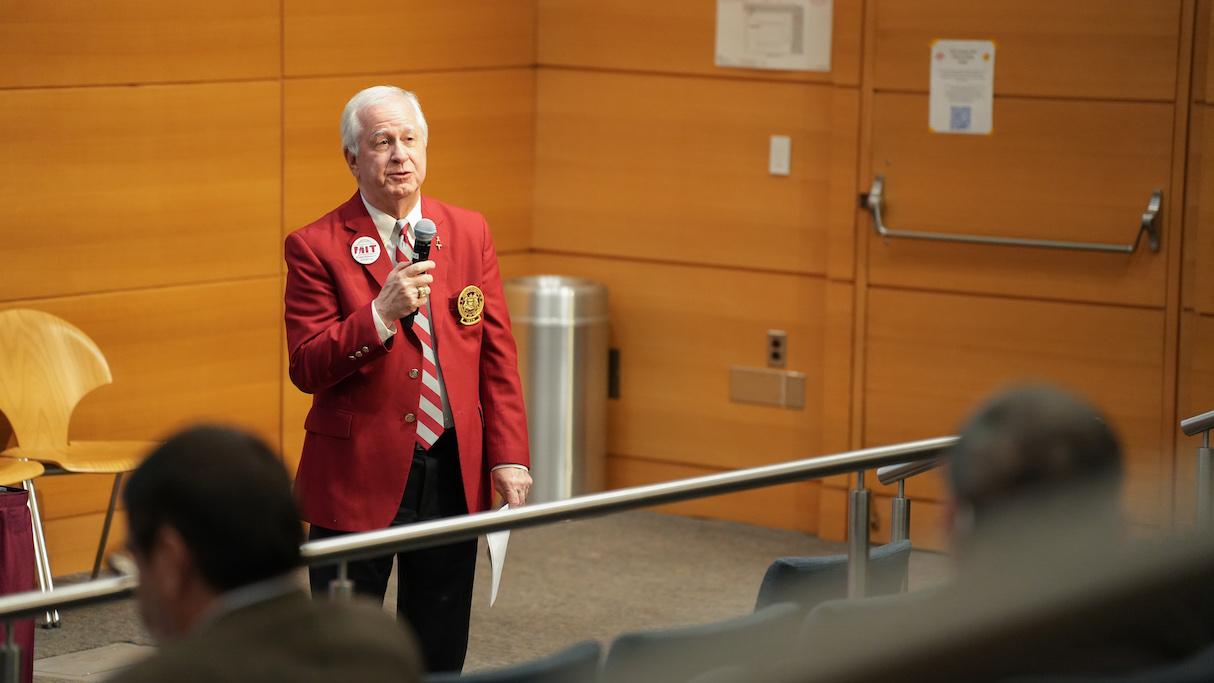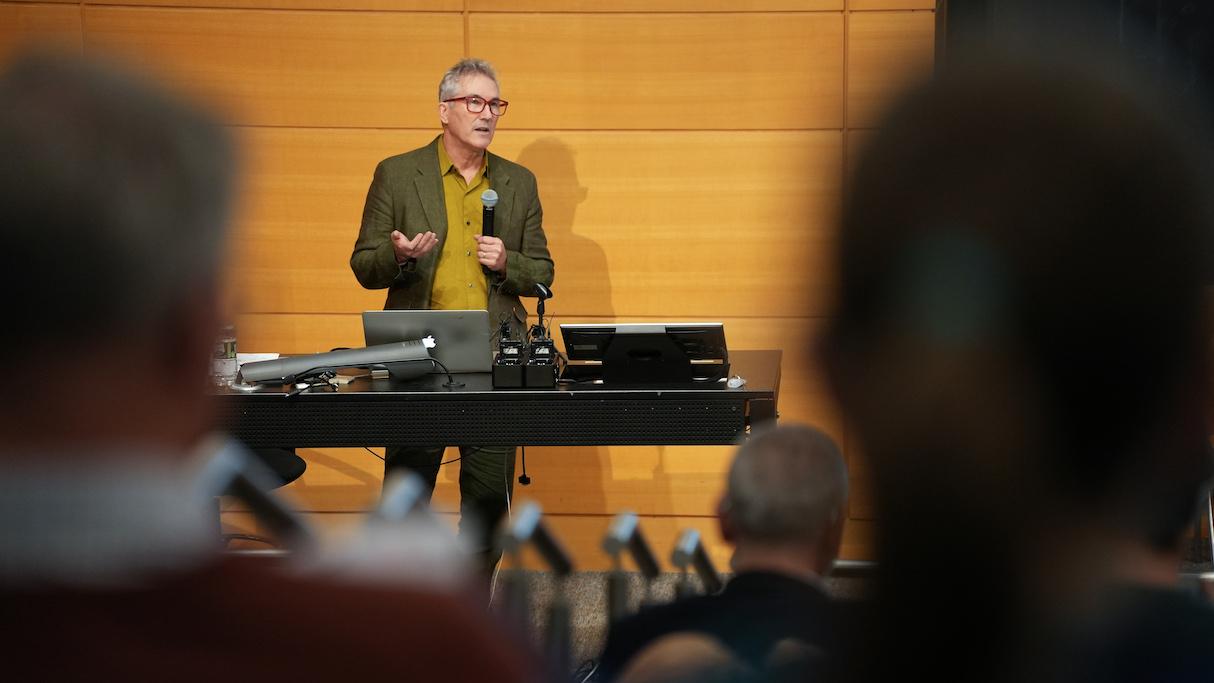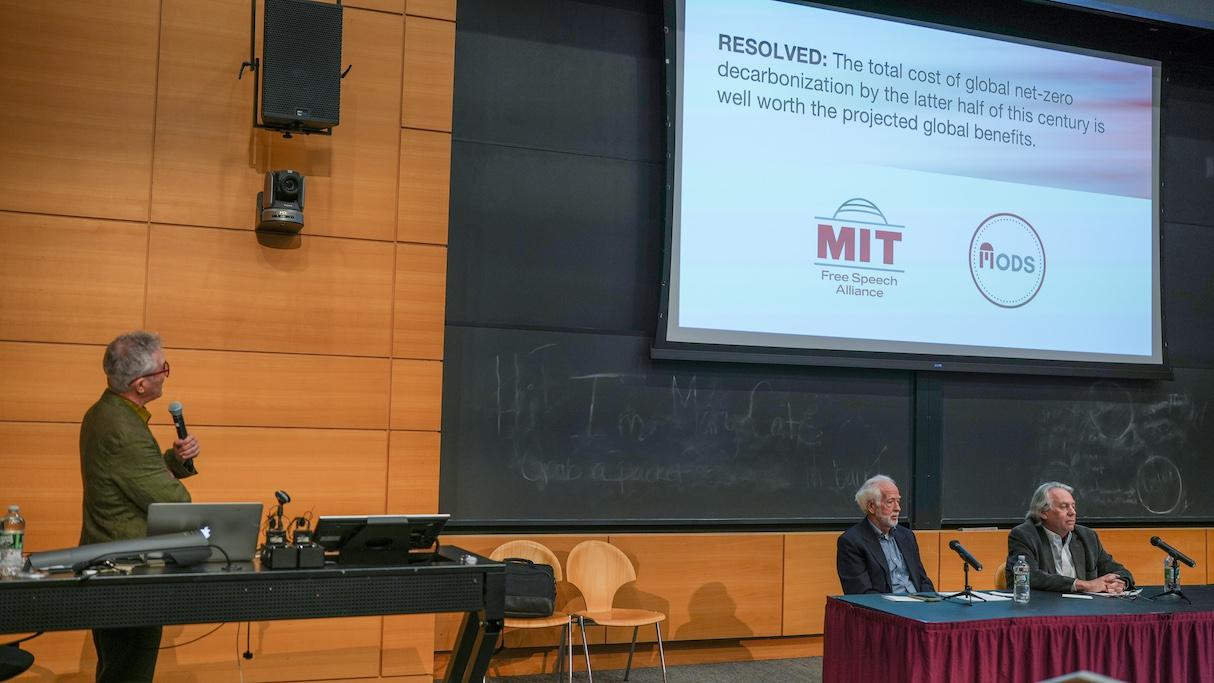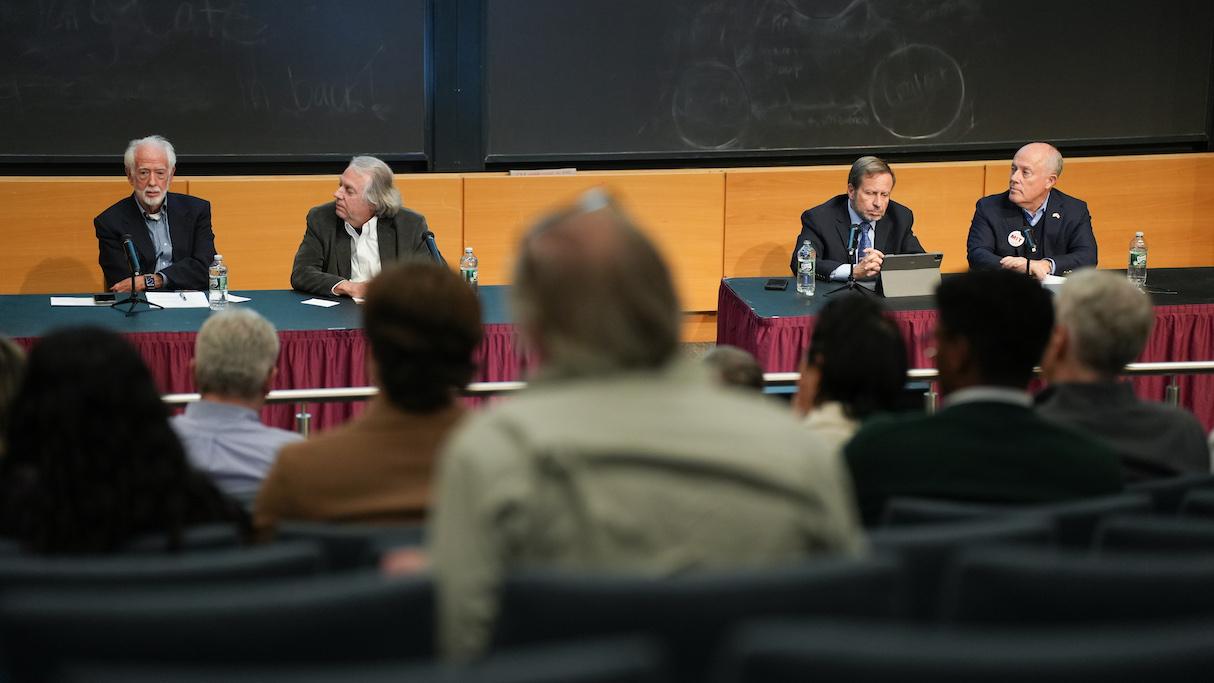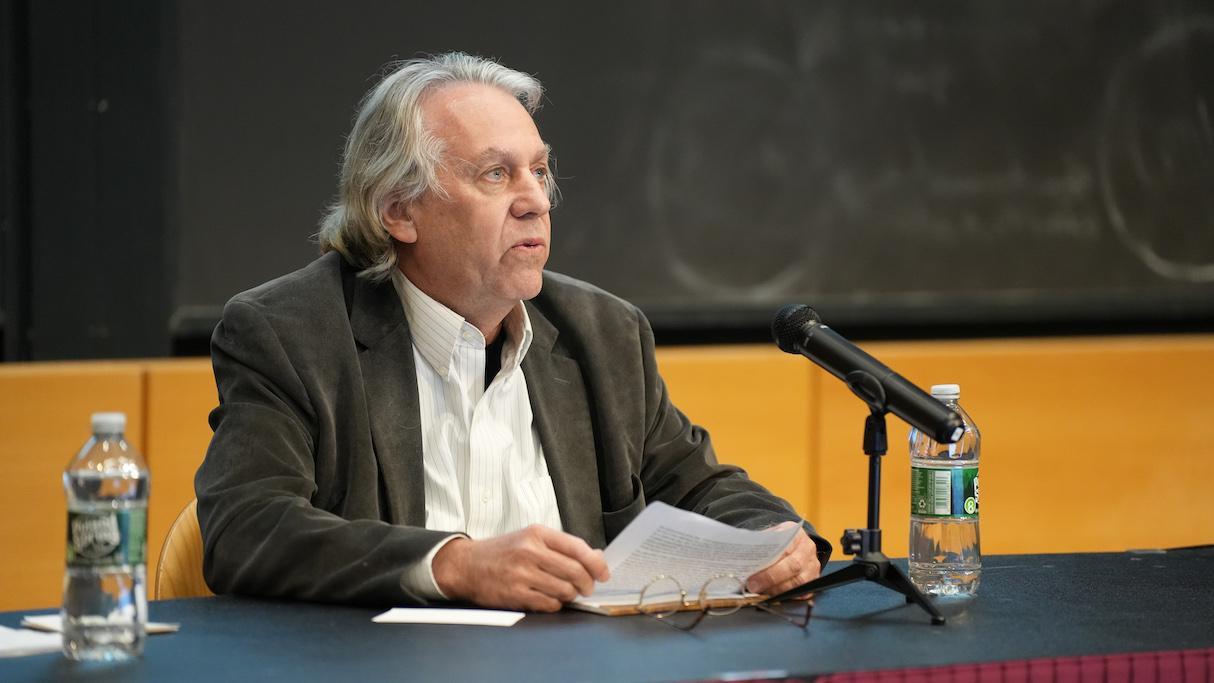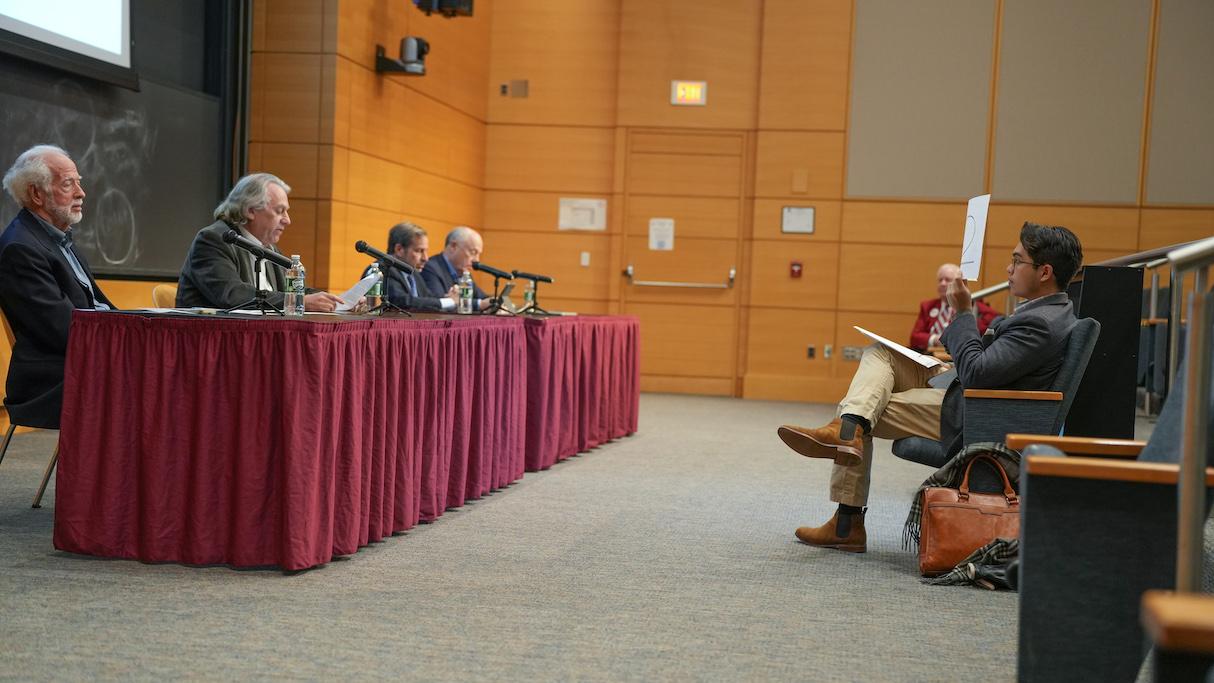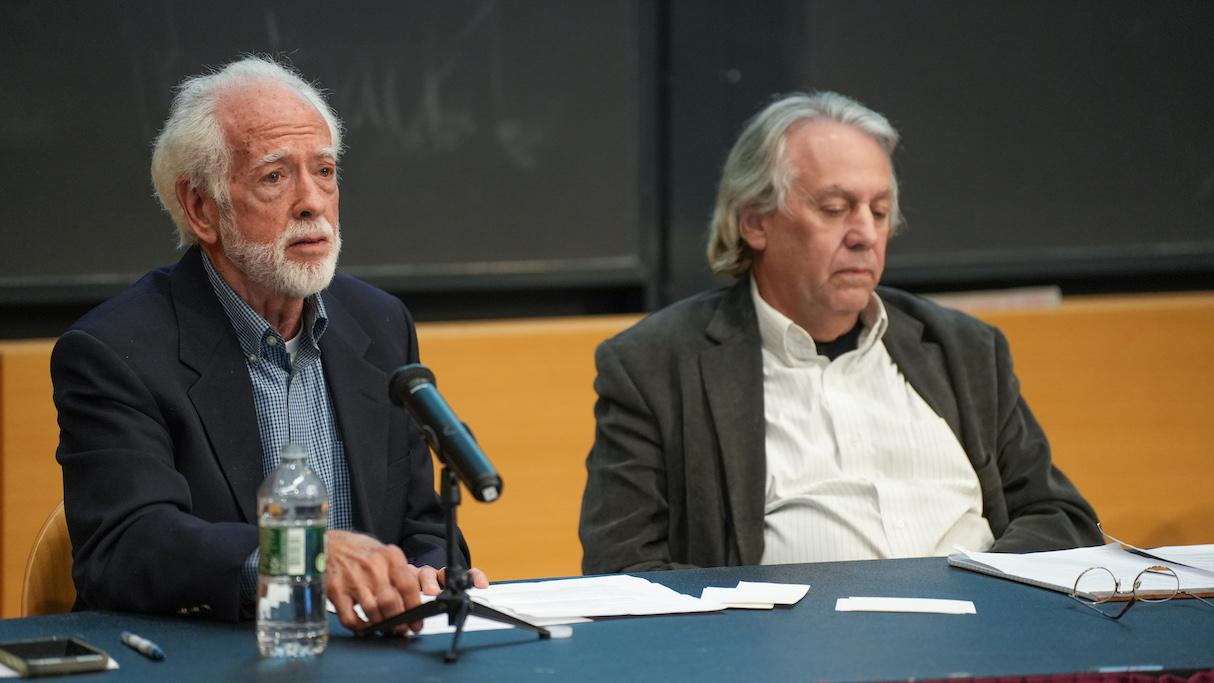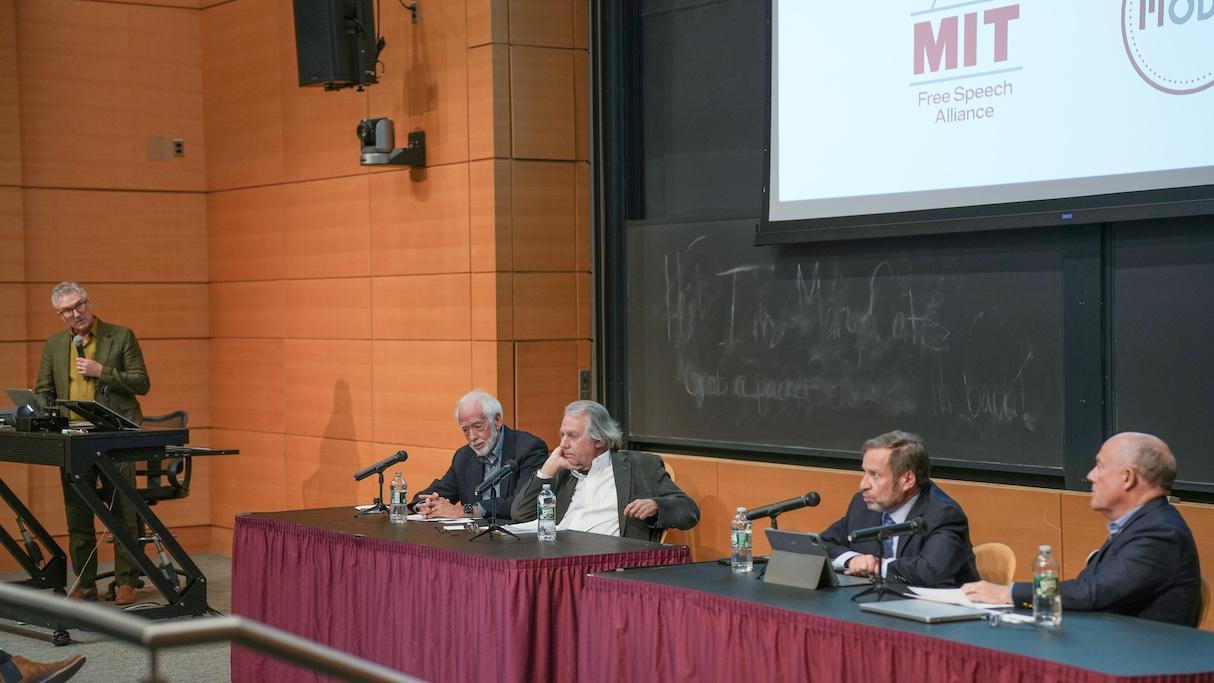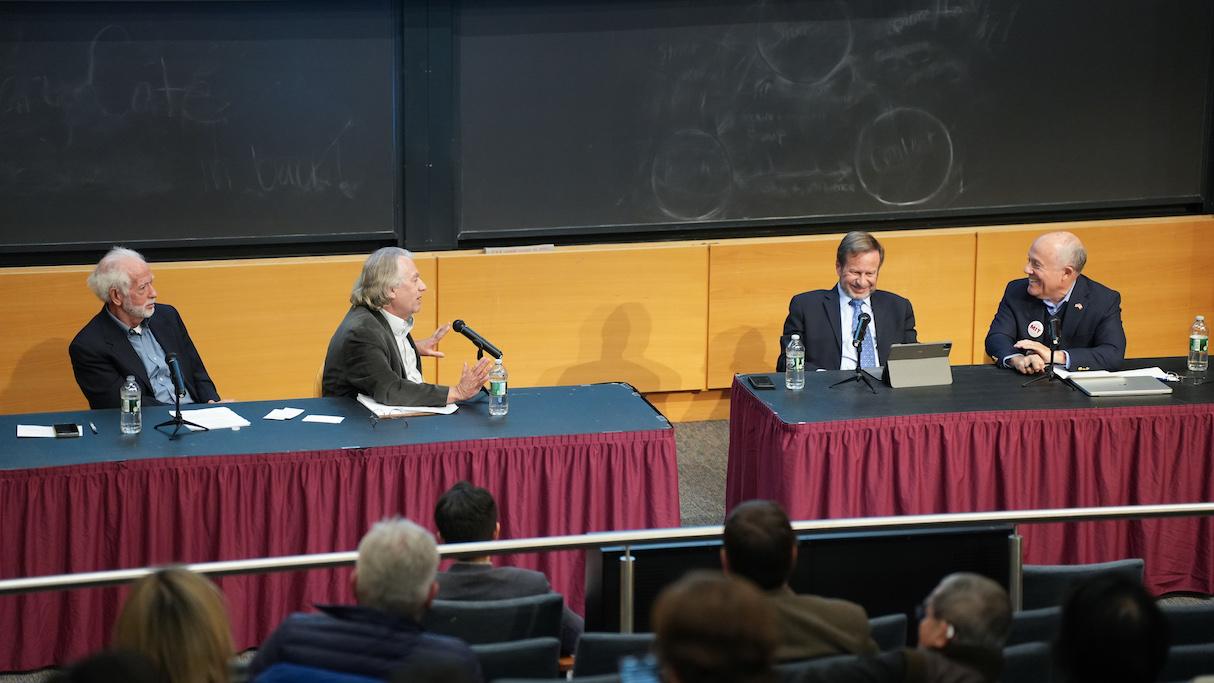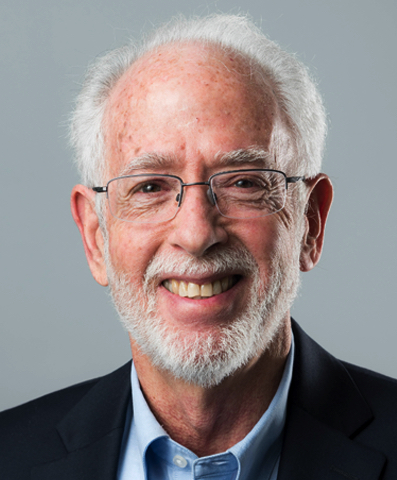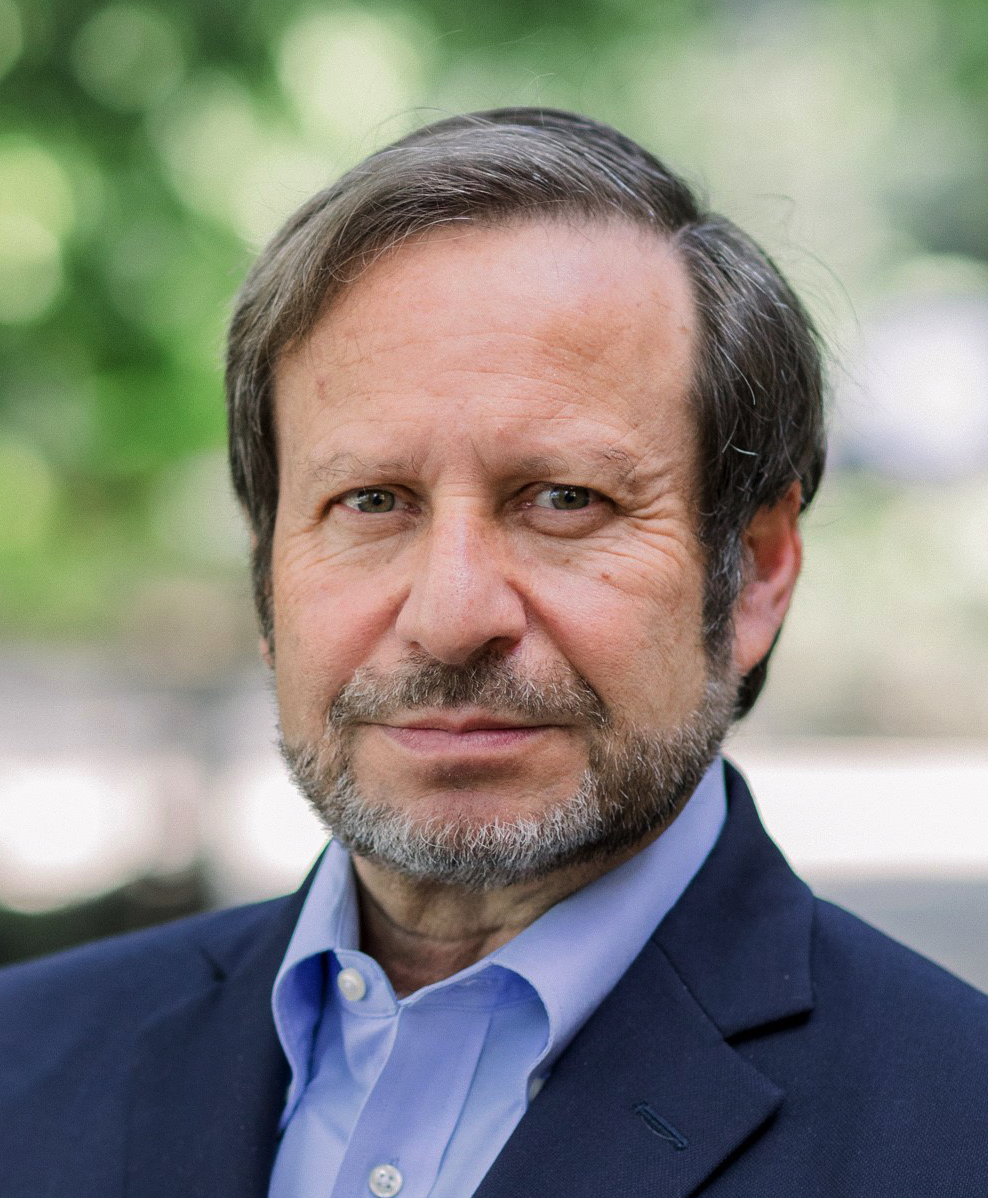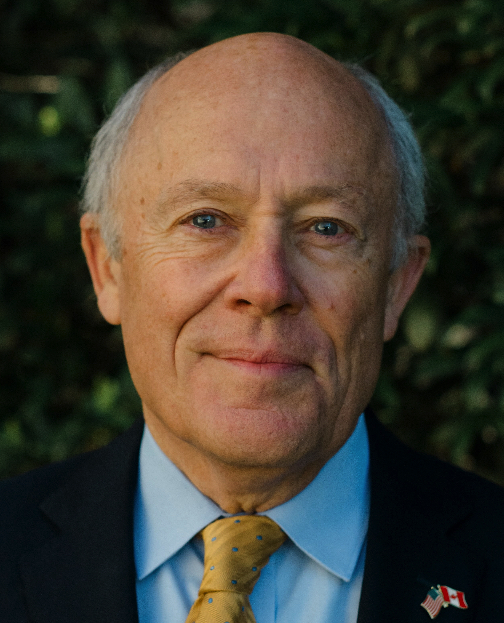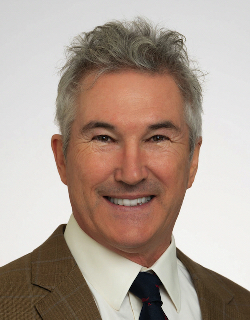Fall 2024 Debate: Is Decarbonization worth it?
Debate: Is Decarbonization Worth the Cost?
November 14, 2024
On November 14, the MIT Free Speech Alliance hosted the fourth in our series of campus debates at MIT, in partnership with campus sponsor the MIT Open Discourse Society, and joined by 20 additional co-sponsoring organizations. The debate was held in MIT's Wong Auditorium, with the following resolution up for discussion:
Resolved, The total cost of global net-zero decarbonization by the latter half of this century is well worth the projected global benefits.
The Affirmative Team consisted of Kerry Emanuel, MIT Professor Emeritus of Atmospheric Science and co-founder of MIT’s Lorenz Center, and Robert Pindyck, MIT Sloan School Professor of Economics and Finance and past President of the Association of Environmental and Resource Economists.
The Negative Team consisted of Steven Koonin, Senior Fellow at the Hoover Institution and former Under Secretary for Science, and Mark Mills, Executive Director of the National Center for Energy Analytics and faculty fellow at Northwestern University’s school of engineering.
Debate Photos
Debate Recording
Participants
Kerry Emmanuel is emeritus professor of atmospheric science at MIT, where he was on the faculty from 1981 to 2022. Before that he was on the faculty of UCLA from 1978 to 1981. He is the author or co-author of over 300 peer-reviewed scientific papers, and three books, including Divine Wind: The History and Science of Hurricanes, and What We Know about Climate Change. He was a co-founder and co-director of MIT’s Lorenz Center, a climate think tank devoted to basic, curiosity-driven climate research. He is the Chief Scientific Officer and co-founder of WindRiskTech, LLC, which provides clients with advanced synthetic tropical cyclone events sets for assessing current and future tropical cyclone risks worldwide.

Robert S. Pindyck is Professor of Economics and Finance in the Sloan School of Management at MIT. He is also a Research Associate of the National Bureau of Economic Research, and he has been a Visiting Professor at Tel-Aviv University, Harvard University, and Columbia University. He is a Fellow of the Econometric Society, a past President and Fellow of the Association of Environmental and Resource Economists, and a winner of the Jamieson Prize for Excellence in Teaching. Professor Pindyck has published numerous academic journal articles, and e is also the author or co-author of eight books. In addition to his academic research and teaching, he has been a consultant to a large number of public and private organizations.
Steven Koonin, a Senior Fellow at Stanford’s Hoover Institution, has served as the Department of Energy’s Under Secretary for Science, as Chief Scientist for BP, as a University Professor at NYU, and as Professor and Provost at Caltech. He is member of the National Academy of Sciences and a Governor of Lawrence Livermore National Laboratory. Koonin holds a BS in physics from Caltech and a Ph.D. in theoretical physics from MIT. He wrote the bestselling book Unsettled: What Climate Science Tells Us, What It Doesn’t, and Why It Matters.
Mark Mills is Executive Director of the National Center for Energy Analytics, a contributing editor at the City Journal, a faculty fellow at Northwestern University’s school of engineering, and co-founding partner in Montrose Lane. He is author of the book The Cloud Revolution: How the Convergence of New Technologies Will Unleash the Next Economic Boom and a Roaring 2020s, (2021), and previously: Digital Cathedrals, (2020), Work in The Age of Robots (2018), and The Bottomless Well, (2006). He served as chairman and CTO of ICx Technologies, helping take it public (2007). Earlier, Mark served in the Reagan White House Science Office and was an experimental physicist and development engineer in microprocessors and fiber optics.
John Tomasi (Moderator) is a political philosopher who earned his graduate degrees at Oxford University. He has held teaching and research positions at Princeton, Stanford and Harvard Universities. Tomasi was for many years the Romeo Elton 1843 Professor of Natural Theology at Brown University. In January of 2022, Tomasi left his (comfortable!) chair at Brown to become the first President of Heterodox Academy in NYC.
Heterodox Academy is a non-partisan, non-profit organization of 7000+ university professors and administrators who love their universities and try to help them to live up to the ideals of open inquiry, viewpoint diversity, and constructive disagreement.
Debate Co-Sponsors
For more information about our co-sponsors:
- Adam Smith Society
- Alumni Free Speech Alliance
- American Council of Trustees and Alumni
- Arizona Strategies
- Braver Angels
- Cornell Free Speech Alliance
- Foundation Against Intolerance & Racism (FAIR)
- Foundation for Individual Rights and Expression (FIRE)
- Free to Choose Network
- Harvard Alumni for Free Speech
- Harvard Union Society
Debate Transcript:
A Note on the Transcript: This text was generated by an automated transcription service from the video recording of the live event. While it has been formatted for readability, it may not be a perfect representation of the spoken word and could include transcription errors. For critical reference, we recommend consulting the original video recording.
[0:00] Wayne Stargart: I'm Wayne Stargart, I'm the president of the MIT Free Speech Alliance. We're one of the co-sponsors for the event tonight. So, along with the MIT Open Discourse Society, who's the lead sponsor, and over 20 other co-sponsors that you see on the screen behind me, we welcome you to the Fall 2024 debate on the MIT campus.
Now, in addition to welcoming those of you who are here in person, I want to also welcome everyone who is watching this on the live stream. And in addition, I want to welcome the thousands of people that will watch the recording of this debate on the MIT Free Speech Alliance YouTube channel.
[1:11] Now, this is our fourth debate, and this time we're going to introduce a little bit of a wrinkle. We're going to add the ability for you to participate and continue the debate afterwards by using a, uh, AI-moderated discussion forum. We partnered with Sway, a, uh, research project out of Carnegie Mellon University that connects people who disagree but facilitates deeper discussions and rigorous debates while encouraging civility. So, I hope, uh... you see the QR code is your way of joining the debate, and there'll also be links from our website. So I encourage you all to, uh, go on to, uh, Sway and have and join us in an ongoing debate.
[2:10] Before introducing our moderator who will present tonight's resolution, I want to remind us all why we have these events. So these, uh, debates were, uh, a reaction to an event three years ago in which an MIT—in which a visiting professor to this campus had their presentation canceled over personal viewpoints that they held and had expressed in print, but which had nothing to do with their scholarship. So this was an indication to us that MIT had lost a little bit of its deep, uh, commitment to academic freedom and its historic tolerance for a wide diversity of viewpoints. In reaction, we alumni started this debate series to model to the MIT community what is—how to have a, uh, civil, vigorous, intellectual discussion about topics which are controversial and, uh, as well as to broaden the topics, the range of topics which can be discussed.
[3:32] Okay. Now, it's my honor to introduce our moderator for tonight. Uh, Dr. John Tamasi is a longstanding—long-standing friend of MIT and of the MIT Free Speech Alliance. Dr. Tamasi, among many, uh, other, uh, institutions, uh, earned his PhD from Oxford, and he held, uh, a chair, a professorship chair at Brown University for several years. But about three years ago, he was enticed away from that comfortable chairman position—chair position, uh, and, uh, to become the inaugural president of the Heterodox Academy. The Heterodox Academy is an international organization of professors who are committed to, um, promoting open inquiry, viewpoint diversity, and constructive disagreement.
Now, Dr. Tamasi was here at MIT in 2023 as the speaker at MIT's inaugural Dialogue Across Differences. He's also a, uh, a friend of, uh, the MIT Free Speech Alliance, having participated in our 2023 conference here on campus, as well as on one of the meetings—uh, one of our member meetings. So we are honored to have him back at MIT. So join me in giving an enthusiastic welcome to Dr. John Tamasi. John, the platform's yours.
[5:07] Dr. John Tamasi: Thank you. Um, it's a pleasure to be here. Um, I'm grateful to the MIT Free Speech Alliance and to Sway and to the many other sponsors who we showed you a moment ago.
[5:24] Let's go to our resolution for the evening. Resolved: The total cost of global Net Zero decarbonization by the latter half of the century is well worth the projected global benefits.
This topic that will be discussing tonight, this evening, is controversial on a variety of dimensions. Most obviously, perhaps, it's controversial because it's connected to broader issues of climate change and some political initiatives, including the Paris Agreement. We're not debating the Paris Agreement; we're not debating climate change. We're debating this resolution. But it's worth just noting and just stating the obvious that this debate is in the context of those political and, to some extent, existential topics that I just mentioned.
Political topics like the Paris Agreement... we've seen a succession, politically, in the US of Obama signing us in, Trump signing us out, Biden signing us in, and the oncoming president likely to sign us out. So that fact about the political teams weighing in and weighing out of that agreement, I think, is an important background that makes sort of extra fizz to this topic tonight, and some dangers for that reason as well. Additionally, the topic of climate change, um, is to, for many people, a supercharged, superheated issue, precisely because it's often perceived, widely perceived, to be a type of existential threat to humanity.
[6:57] In the face of existential threats, especially with a clock ticking, the normal human reaction is to roll out virtues such as solidarity and unity, hanging together, alignment with a common mission in the face of a crisis. Those are all political imperatives. And at a university, especially at a great university like MIT, we need to be aware of those tendencies to move to the virtues of politics, solidarity, rather than the virtues of the academy.
And the virtues of the academy are different, and strikingly different from those virtues I just mentioned. Virtues of the academy include things like, um, difference, heterodoxy, different kinds of viewpoints. At HxA, Heterodox Academy, we think of the university as a community of imperfect learners, a place where people—professors and students alike—come together to learn from one another, from the expertise of professors, from the curiosity of students, to come together with a certain different set of virtues to think about these issues in new ways, to look for new solutions. Um, so pluralism and disagreement is the fuel that we need within this kind of room and this kind of conversation to make the special contributions of universities possible.
[8:40] I'm going to quote something, if you'll permit me, from a Brown president. This is a line from Ruth Simmons, who, um, became... was the first Black Ivy League president. And when Ruth went to Brown, she gave out a wonderful convocation address that struck me so much that I wrote it down, but I think I can actually recite it because I've said it so many times in my own head. And Ruth said—I'll hold this in case I forget part of it—Ruth said, this is an account of what a university is. She said, "While other types of communities devise covenants so as to avoid conflict, our covenant at the university is rooted in quarrel and in opposition. We encourage ideas and opinions to collide in service of learning. At a great university, no idea is out of range or out of bounds." Close quote.
That means, it seems to me, as in Ruth's formulation, that division, quarrel, opposition, are the fuel that we use to make ideas happen and make research go forward within universities.
[10:04] These forces, um, can tear us apart because they are forces of division in important ways, but it's also important to note that not all these forces are centrifugal. Um, and in particular at HxA, we talk about a set of values that bring people together despite their differences that make this magical alchemy of universities possible. So you want to have a plurality of viewpoints, you want to have strongly felt opposed opinions, you want to have a culture of toleration and even celebration of eccentricities and heterodoxy, but you also need to have some common norms that can bring these forces together to produce their magical, progressive work.
[10:34] And in HxA, we have something, these five virtues that we call the HxA Way. I'm just going to list them to you very briefly. First—and these are norms that I'm going to hereby suggest and encourage on our panelists, our distinguished panelists, but they're also virtues and norms for you. They're for you when you ask your questions toward the end of this event, but they're also for you while you sit in your chair listening and thinking to yourself as you're hearing the arguments in front of you.
Number one: Make your case with evidence. When a person gives a piece of data, a piece of evidence, it's kind of a collective collection point where we can sort of find a track, a common way to track reality. Second: Be intellectually charitable. Being intellectually charitable is not mere charity, it's not softness or squishiness. It's intellectual charity, which is a certain kind of charity that involves rigor. It's fully compatible with being extremely rigorous. One way to think about that virtue... is to think about steel-manning your opponent's view rather than straw-manning them. Third: Be intellectually humble. Igave a talk about humility at MIT... and as I noted then, and I'll say it again now, having spent some more time around MIT—and you guys won't mind this, I hope—you know, people don't ordinarily think about humility as a virtue you find among professors, not even, or maybe especially not, among MIT professors. But that virtue of humility is what gets the ability to move forward. The greatest academics I've known... have been people who have had this kind of constant impatience with the status quo... That idea of impatience with one's own level of understanding is what we mean by intellectual humility. Fourth: Be constructive. Don't just tear them down when they screw up, because everyone screws up. Rather, think, what's good in what they said? And finally, fifth and finally: Be yourself. Each of us has a life that brought us to this place... We have views not simply for logical reasons, but for other kinds of reasons as well. It's good to be reminded of that fact occasionally.
[13:32] So with that, let's turn to our conversation and debate. I'll begin by introducing the teams. On the affirmative team, again, affirmative for this resolution, we have Kerry Emanuel, who's the MIT Professor Emeritus of Atmospheric Science and co-founder of MIT's Lorenz Center. We also have on the affirmative team Robert Pindyck, the author of Climate Future... Bob is the MIT Sloan School Professor of Economics and Finance and past president of the Association of Environmental and Resource Economists. On the negative team, we have Steve Koonin, who's a senior fellow at the Hoover Institution and a former Under Secretary for Science, and the author of Unsettled. And Mark Mills, executive director of the National Center for Energy Analytics and a faculty fellow at Northwestern University's School of Engineering.
Our format is complicated enough to have come from MIT. I'll give you the general summary. It's going to be... we're going to go through four different waves. First, there'll be the affirmative teams... a speaker for the affirmative team will speak for eight minutes, then we'll have a two-minute cross-examination from the negative team. Then an 8-minute positive statement from the negative team, two-minute cross-examination, and then we'll do that cycle again. Finally, we'll conclude... with a five-minute rebuttal from each team. At that point, we'll open the floor up to you, the audience.
[15:55] We're going to begin now with Kerry Emanuel for the affirmative team. You have eight minutes.
Kerry Emanuel: Thank you very much. And I'd like to preface my remarks, and here I think I speak for all four debaters, in thanking the MIT Free Speech Alliance for putting on this series of debates. I personally think it's terribly important in the era which we live to be able to freely and openly debate the important issues of our time. And I should say, civilly. So thank you very much.
The phrasing of the proposition before us is a fine illustration of a problem with the approach that some take to dealing with climate change. That is, among those who consider it a problem at all, cost-benefit analysis is appropriate where both the costs and the benefits are well known. When they are not, it becomes a problem of risk assessment and management. One is dealing with probabilities, not deterministic numbers. And we must consider the large range of risk aversion among even the most educated populace. It's a very different problem from cost-benefit.
So to illustrate this, uh, consider how you would have felt if you can imagine yourself back in this time, how you would have felt about a proposition posed in, say, 1940 as: Resolved, the cost to the US of entering World War II is well worth the projected benefits. At the peak of the war, the US was spending 40% of its GDP on the war effort. 4-0. And what were the benefits? Better airplane engines, more effective artillery, atom bombs... Gee, I guess we better not fight this war. Better to spend our money adapting to life under fascist rule. Fortunately, clearer heads prevailed. We saw the risk and dealt with it.
The climate problem we confront today might be posed as a classical problem in risk assessment and management, were it not for the fact that the risks are distributed across a broad swath of our future, extending well beyond the lifetimes of even the youngest person in this audience... Mitigating the risk involves paying today to avert potentially catastrophic risks tomorrow, although recent experience shows that tomorrow is becoming today.
The counterargument to our own is usually made by a group of people who do not deny that climate change poses risk, but argue that the cost of mitigating that risk are not worth the economic pains we would suffer today. Their arguments usually make two serious errors which, in my view, render them incorrect. First, they do what no actual risk manager would do, which is to price the most probable outcome rather than to integrate the cost over the whole probability distribution of possible climate outcomes. Because the costs rise nonlinearly, and sometimes very nonlinearly, with the magnitude of climate change, this is a serious error. This is particularly true when there is an existential tail in the risk distribution. Second, they contradict themselves when they argue that this inappropriately estimated future risk will cost something like 3% of future GDP, a trivial cost in their view, while spending 3% today would be catastrophic to our economy. Can't have it both ways, even with clever discounting.
The fact of the matter is that uncertainty about the results of increasing by, order of 100%, the concentration of the most important long-lived greenhouse gas in our atmosphere... encompasses unacceptable risks. No parent would allow their seven-year-old child to run across a busy intersection to catch her bus if they estimated there was a 10% chance she would be run down. An argument by the bystander that, "Well, the most likely outcome is no injury, so let her run," would hold no sway, even though driving her to school might make the parent late for work with some consequences. Yet we constantly hear arguments that climate risk isn't that large and we don't want to incur any real cost today by folks seemingly quite prepared to throw not just one child but whole generations under the bus.
The pity of this is that unlike many of their less well-informed colleagues, our opponents largely agree with me, I believe, on the technical approach to mitigating climate change, which involves a wholesale, full-throated commitment to building out nuclear power supplemented by renewables. We know for sure this would work because several nations, notably Sweden and France, already decarbonized their electricity production using nuclear and hydro power, and did this almost 50 years ago with no perceptible change in their GDP growth. Look, we can talk about discount rates and all that, but the fact is that the experiment has been performed by several advanced nations who decarbonized their electricity, at least, with no perceptible damage to their economies. And nuclear energy has also proven to be the safest technology we've invented so far.
Yet, even my colleagues at the MIT Energy Initiative, while privately concurring that nuclear power must be an important part of decarbonization, emphasize renewables in their documents and press releases, perhaps lacking the courage of their actual convictions. The abandonment of nuclear energy by the West has led to the absurd and tragic outcome of three Chernobyl deaths per day—per day—that are currently lost to respiratory diseases stemming from fossil fuel combustion.
Yet here we stand, equivocating at the thresh of a potentially far greater tragedy, imposing absurd and costly regulations on nuclear power plants, such as insisting through an act of Congress that they be able to withstand a one-in-10-million-year earthquake or windstorm, while at the same time promoting highly weather-sensitive and volatile renewable energy that has the effect of prolonging our dependence on fossil fuels. So I call on our distinguished opposition team members to abandon their Panglossian efforts to downplay climate risk and switch to promoting solutions that will carry us into the 22nd century, while enabling the elimination of energy poverty in developing nations and the responsible growth of artificial intelligence, which requires substantial energy resources. Thank you.
[22:54] Dr. John Tamasi: Thank you, Kerry. We now have two minutes for cross-examination by the negative team.
Steve Koonin: So Kerry, thanks a lot for, uh, kicking things off in a very appropriate way. Um, when I listen to the politicians and the media, I don't get a sense of probabilities, I get a sense of definitiveness. If you listen to Secretary General Guterres, for example, we are on a road to climate hell with our foot on the accelerator. It's very different than what you just said, and of course what most scientists understand. Why is it that the scientific establishment has not called him and other people out for that kind of misrepresentation?
Kerry Emanuel: Uh, excellent question, Steve. Um, some of the scientific establishment has called out such people. As you can imagine, they are not usually selected for publication in newspapers. You have a point. And one of the problems we have in this whole climate business is there are lots of folks out there who get it wrong about risk and, uh, feel that we have to argue certainty to be heard. So, yeah.
Mark Mills: Sure. I think that's—again, thanks, MIT, and it's a great, great kickoff. Uh, here's an interesting, uh, problem and I wonder how much you've thought about this. France is a great example of a country that embraced nuclear energy. I'm a nuclear bull like you. Uh, but, uh, what the French do proper accounting, and perhaps you've looked into this as well... what it turns out they've done, they've exported their carbon footprint. And when they undertook an examination of their total per capita carbon footprint, counting imports of goods, materials... they've concluded that their per capita footprint went up, not down, as they expanded their nuclear capacity, because as you know, electricity is only a third of all the energy supply. So this is the challenge: is how do we get our arms around proper accounting? Because the world's carbon emissions have been rising, not declining.
[25:05] Dr. John Tamasi: Thank you. I'm going to move if I may. Okay. Um, so the next... next wave, it will be, uh, for the affirmative—sorry, for the negative team. Steve Koonin, you have eight minutes.
Steve Koonin: Thank you. The resolution requires that we consider the benefits of 50-year decarbonization. The time scale comes from the Paris goal of limiting global average temperature rise to 2 degrees Celsius, and then we must compare those benefits with the cost of achieving Net Zero. That comparison is complicated, not least because of the uncertainties in the allegedly avoided impacts of human influences on the climate and in the cost of Net Zero. There's also the issue of "well worth it to whom?" as well as the question of what urgency is there in reducing emissions.
I have three points to make. The time scale for reduction is arbitrary, the climate threat is far from dire, and the cost-benefit calculus very much depends upon who's doing the calculation.
Let me start with the Paris goal itself: less than two-degree rise in the global average surface temperature, which has been deemed to require Net Zero global emissions by the latter half of this century. Yet emissions continue to rise and will again be at an all-time high this year. The subtitles of the UN's annual Emissions Gap Report give a flavor of the lack of progress. In 2023, it was "Broken Record: Temperatures hit new highs, yet world fails to cut emissions (again)." And this year, it was "No more hot air, please." But even that two-degree limit is not a hard one. When I asked many years ago Hans Schellnhuber, the so-called "father of the two-degree limit," why two degrees, he responded, "It's about right, and it's an easy number for politicians to remember." So all manner of chaos will not suddenly break out if we hit two or even three degrees.
Next, is the climate threat so dire that it requires the precipitous action of transforming the entire world's energy system in a few decades? The answer to that question is not as uncertain as our opponents claim. Consider that the globe has warmed 1.3 degrees in the last 120 years, since 1900, and about the same amount of warming is expected over the next century. So we have some guidance from the past. In fact, rather than catastrophe, humanity has seen unprecedented prosperity, despite or perhaps because of that prior temperature rise. The global average lifespan has gone from 32 years to 72 years. Per capita GDP has gone up by a factor of seven. The literacy rate has soared, and the death rate from extreme weather events has decreased by a factor of 50. So it's hard to believe that comparable warming over the next century is going to significantly derail that progress.
And in fact, the consensus of economic impact studies, as published by the Biden White House last year, is that the US GDP would be only a few percent smaller for a few degrees of warming. That's not a few percent per year, but a few percent when the warming has occurred. That's in the noise, as we physicists say. Of course, there will be differential impacts, there are uncertainties, and GDP isn't everything. Nevertheless, those are hardly predictions of a catastrophe.
If you listen to the popular media, you might believe that we humans have already broken the climate. Yet the IPCC can't find climatically significant trends in most climate impact drivers, let alone attribute them to human influences. Losses from extreme weather events are actually declining as a percent of GDP as the world becomes more resilient. And projections of future warming have moderated as the IPCC refines its models and the world emits somewhat less than has been expected.
Finally, the resolution begs the question of "worth it to whom?" While the one and a half billion of us in the developed world have adequate energy, most of the world craves more energy. The inequalities are astounding. Nigerian per capita energy consumption is 1/30th that of the US, and some three billion people in the world use less electricity every year than the average US refrigerator. Fossil fuels are the most effective way of providing the reliable and affordable energy those folks need to improve their lot. So any restraints on emissions immorally hinders development. Decarbonization is an unaffordable luxury for most of the world, who face many more immediate, tangible, and soluble problems than the risk of some future climate disbenefit. Urging, cajoling, requiring the developing world to forbear fossil fuels, as the World Bank and other financiers have been doing, is directly contrary to human flourishing. It's like telling a starving person not to eat that steak because of... it might be a cholesterol problem.
You might counter that there are other benefits of eliminating fossil fuels, for example, reducing local air pollution. But consider the case of China, where life expectancy increased by 10 years between 1980 and 2020, even as fossil fuel use increased by 700%.
In accounting costs and benefits globally, you also have to include the benefits of rising CO2 levels. Yes, I know for some of you, it might be difficult to believe that there are benefits, but let me assure you that there are some. One of them is deaths from extreme temperatures have decreased in recent decades, since roughly 10 times as many people die from extreme cold events, which are declining, rather than from heat waves, which are increasing modestly. Another is that the Earth has greened palpably... That's also caused agricultural productivity to soar, since plants love CO2.
In summary, there's no climate emergency or climate crisis, and hence no need for precipitous decarbonization that's implied by the resolution. As Mark Mills will describe, that kind of energy transition will be—in fact, already is—disruptive and very expensive.
[32:30] Dr. John Tamasi: Thank you, Steve. We now have two minutes for cross-examination by the affirmative team.
Robert Pindyck: Yeah, Steve, let me ask you a question, um, to make sure I understand what you said. I think you said that there's a lot of uncertainty about what's going to happen, a lot of uncertainty about how the climate system works, a lot of uncertainty about what might happen to temperatures and what the impact on GDP and so forth might be. We live in a world of considerable uncertainty. Am I right about that?
Steve Koonin: There's certainly uncertainty in the science, absolutely, and also in the economics.
Robert Pindyck: Yes, of course. Okay, good. So we're in agreement on that, right? We live in a world of uncertainty.
Steve Koonin: Yep, we do.
Robert Pindyck: Okay. Um, it would be very nice, and I wanted to ask you this question, if science could just learn from the past. The fact that we've had about a degree and... 1.3 of warming and extrapolate that to the future. Why do you think scientists haven't done that, largely? Done the exercise that you did, saying, "Well, it's another 1.3 degrees, we lived through 1.3 without any problems, so the next..." Why do you think they haven't done—
Steve Koonin: I don't know what you mean by "done the exercise." Certainly the facts I reeled off are well known to scientists and, um...
Kerry Emanuel: I'm just wondering if you're aware of other man-made influences on climate other than CO2.
Steve Koonin: Oh, of course. There's methane, there are aerosols, which cool, yes... And the other greenhouse gases, of course. The aerosols have been a big contribution.
Kerry Emanuel: And they're going...
Steve Koonin: Yeah, if I have 20 seconds, a story. When I got to BP, BP was pushing gas as a bridge to a low-carbon future. And I reminded them, I did a back-of-the-envelope calculation, that the offsetting loss of aerosols would be much greater warming, uh, than any decrease in the emissions. And of course, other people have done that calculation since. So it's complicated. That's why the 1.3 degrees is not really a good guide, because it doesn't involve the aerosols in the future.
[34:53] Dr. John Tamasi: Thank you. Um, we're now going to move to the third wave. Um, Bob Pindyck has eight minutes to speak on the affirmative for the affirmative team.
Robert Pindyck: Thanks. So I'm going to pick up on where Steve left off on that question I asked about uncertainty. That we live in a world of uncertainty. And I want to tell you just briefly, I want to summarize some of the uncertainty involved in climate change and its impact.
There are two things that we're very uncertain about. One is called... what we call climate sensitivity, which means that even if we knew how much CO2 we're going to be emitting over the coming decades and we knew what the CO2 concentration in the atmosphere will be, what would that do to the temperature? And the answer is, we don't really know. We have probability distributions... but we don't know the actual number.
The second area where there's even much more uncertainty is the impact. Suppose we knew for certain that we're going to have a 3-degree increase in the global mean temperature in the next 30 years. What would that do? If it doesn't do anything to GDP or to life as we know it, who cares? What matters is what happens if it does do something. What would be the impact of that three degrees of warming on our economy, on our society, and so on? And the answer there is we really don't know. We know very, very little because we've never experienced, as an industrial society, warming of three degrees. We don't have data... So we just don't know. There's a huge amount of uncertainty.
So you might think at this point that, um, I've joined the negative team, right? Because, you know, we don't know anything. And so, do as Steve's suggestion, I mean, we should wait. Let's learn more before we start spending money, before we start decarbonizing right now. Stephen and Mark, um, I assume you don't bother with health insurance because you don't know whether you're going to get sick, or when you're going to get sick, or how sick you might get, and what your medical bills might look like. So why insure? I mean, there's too much uncertainty. And if you own a home, I assume you don't bother with homeowner's insurance because you don't know if a tree is going to fall on your house and when or if, and how much damage that will cause.
I, on the other hand, take the opposite view. I do have health insurance, and I do have homeowner's insurance. And I think we need climate insurance. It's the uncertainty that is the reason we need to do something to decarbonize. It's the opposite conclusion. I agree with Steve that there's a huge amount of uncertainty about climate change... Steve's conclusion is, "don't do anything." My conclusion is exactly the opposite. We worry about the tail event. We have to worry about the possibility of a low-probability but extreme outcome. That's the concern. And so we need to insure against that possibility.
Now, if you talk about costs and benefits and ask yourself, "Gee, should I buy insurance? Should I insure my home?" I hope you understand this: that the expected benefits from insuring your home are less than the cost. Why is that? Because otherwise, there would be no market for insurance. Nobody would sell insurance if they expected to lose money...
How likely is a catastrophic outcome in climate? We don't know. And how extreme would it be? We don't know. We can think about possible catastrophic outcomes. We could imagine that we could have an outcome that could lead to a drop in GDP of 40-50%. Maybe there's only a 10% probability of that. Suppose there are two possibilities: no climate change, no impact, zero, no problem—90% likelihood. 10% likelihood of a catastrophic outcome that leads to a 50% drop in GDP... The expected outcome, the average of all of that, is .9 times 0 plus .1 times 50. That's a 5% drop in GDP. And you might say, "That's not such a big deal. That's just a bad recession, not too bad. Therefore, let's not do much." But you see the problem is that the 50% drop in GDP is much worse than 10 times worse than a 5% drop, because with a 50% drop, we have people starving, we have people dying. That's twice as bad as the Great Depression.
So you have to look at that possibility of a tail outcome. And that's the reason that we have insurance.
[41:53] Let me also emphasize that, you know, um, we're talking about an absolute here: global Net Zero. If we went to an 80% decarbonization, we'd get most of the way there. It's that last 20% of decarbonization that's the most expensive, and that first 80% would give us a hell of a lot of insurance. So we don't have to make this a dichotomy of all or nothing. We could easily decide, "Yes, we're going to go to 80%," which is much more cost-effective. All right, let me stop here.
[42:34] Dr. John Tamasi: Thank you. We now have two minutes of, um, cross-examination by the negative team.
Steve Koonin: Bob, let me insure—assure you that I do carry health, home, and life insurance.
Robert Pindyck: Oh, good.
Steve Koonin: Do you know what fraction of US adults do not carry life insurance?
Robert Pindyck: It's very high, I know that.
Steve Koonin: It's about half. And you know why they don't carry life insurance?
Robert Pindyck: Because they can't afford it.
Steve Koonin: They cannot afford it. That's correct. So there are countervailing considerations. They got to pay for the household and so on. So it's very important to include the cost of insurance against the outcome, if you like. I agree. Now, if you were running China—I'll put you in charge, okay, good luck—what would you do with respect to this issue?
Robert Pindyck: Yes, and I think China is, in fact, going to be in the same situation where they're going to have to worry about extreme outcomes... and that means they may go at it more slowly than we will. We are going to have to have an international agreement, clearly. We're talking about global Net Zero; we're not talking about just the United States. China is a much bigger emitter... India is about 8% of global CO2 emissions, but it's rising very rapidly. We're going to have to have an international agreement, and my advice to the Chinese would be that, yeah, you're going to have to start moving to nuclear more rapidly.
Mark Mills: Well, it's an interesting problem for China... They're building roughly a coal plant a week now... The solutions that we're offering in America, as I'm sure you know, is heavily weighted to photovoltaics. Uh, 90% of the world's photovoltaic cells are manufactured in China... on coal-fired grids. China now burns 300 million tons of coal a year to produce the world's solar cells. And so what we're doing with our subsidies here is buying Chinese coal to put solar cells on roofs here, which is having no net effect on CO2 emissions, but it is transferring wealth to China and geopolitical power. Seems like a bad trade.
[46:00] Dr. John Tamasi: Thank you. So we're going to move on now... to our fourth wave. Um, Mark Mills has eight minutes for the negative team.
Mark Mills: Well, as we've seen, the goal to decarbonize global energy systems, uh, as our noble opponents have pointed out, is an insurance policy. The cost of that insurance is... self-evidently the key determinant of willingness to pay for insurance. And estimating those costs distills to a technology evaluation... It's in the cost of insurance... if the cost of the insurance rises to be as expensive in the range of the cost of the consequences, we begin to have problems.
There's a kind of a tendency these days to be captivated by aspirational technologies... The reality is that the industrial-scale systems of any kind that can be built in the immediate future using technologies are those that we already know how to build... and about which we know a lot. We have a lot of robust and reliable data.
We have some evidence that illuminates the real-world decarbonization costs... Since the year 2000, the US and Europe have spent roughly 10 trillion dollars to avoid, replace, or minimize use of hydrocarbons. And that did manage to lower the hydrocarbon share of global energy by about two percentage points, from 84% to 82%. But in absolute terms, the use of oil, gas, and coal have all increased... Similarly, the decadal subsidies directed at electric vehicles... has indeed displaced oil that would otherwise be used, but the absolute consumption of gasoline has risen and is now higher than any time in history. If 10 trillion dollars didn't cause any net decarbonization, what would it take? Based on recent experience... to drive hard to a share of energy down to just half of all 2050 energy needs would take something like 100 trillion dollars.
And even then, the absolute quantity of hydrocarbons used in 2050 would still be about the same as today in order to supply a greater total world energy demand. And that assumes the central conceit that solar, wind, and battery costs will radically decline, and that's—that claim is not supported by reality... Far more metals and minerals are needed to build those machines than to build hydrocarbon machines. The IEA's analysis finds partial decarbonization... would require fantastical increases in global mining, depending on the mineral, from four-fold to a 40-fold increase... The core problem, as the IEA has pointed out, it takes 15 years on average to open a new mine.
Meanwhile, we have Germany as another source of macroeconomic evidence of real-world decarbonizing. Over the past two decades, the German government has roughly doubled the total capacity of its electric grid, primarily building solar and wind, but necessarily keeping about 80% of the original grid. But German's electric demand only increased by under 10%. The economic impact of that was to roughly triple Germany's electricity costs. This not only increased energy poverty in Germany but makes it energy fragile, setting it up for disastrous consequences with the Ukraine war's loss of discounted Russian gas.
Meanwhile, here in the US, in the past half-dozen years, we've seen a doubling in the wholesale prices for utility-scale solar and wind projects. At a society scale, the experience has made a lie of claims that solar and wind, especially with battery storage, are inherently cheaper... The actual cost of the IRA are 2 to 3 trillion dollars. For context, that rivals the 4 trillion dollars, in inflation-adjusted terms, that the US spent to prosecute World War II... The National Bureau of Economic Research... found that the EV subsidies alone are $23,000 to $32,000 for each vehicle. This is truly China-level subsidization.
There's an inevitable future, of course, with lots more EVs, lots more solar and wind installations, but the imagined all-EV future, the all-wind and solar future is economically, and derivatively politically, impossible.
[53:51] Dr. John Tamasi: Thank you. We now have, um, two minutes for response from the affirmative team.
Robert Pindyck: Thank you, Mark. That was very interesting, uh, data. I certainly understand the situation in Germany is very bad. I want to ask you a hypothetical. Supposing the scientific community in the next few years managed to convince you that there was enough, let's say, existential risk in climate change that you'd want to do something about it. And supposing you were in a position to do something about it... supposing you were persuaded that we had to do something, yeah, what would you recommend doing?
Mark Mills: Well, the answer is in two buckets. Uh, one is patience... and the other is, um, uh, adaptation and resilience. For this very simple reason: the data that I study show that it isn't possible to, in fact, decarbonize society in the timeframes imagined... The electric car is seen as a zero-carbon vehicle, but building electric cars requires tons, gigatons of mining, unavoidably, with oil-burning machines. In fact, if the research is properly parsed... the actual emissions reductions from an EV is near zero, and in fact, may net increase emissions... So the answer is, if I'm Tsar, I say stop wasting money on yesterday's technologies, subsidizing those, which we're doing, and subsidize more basic research to find the... miracles... and then spend money on adaptation and resilience.
Robert Pindyck: So your answer, just to clarify, to my hypothetical existential risk is we learn how to adapt to it?
Mark Mills: Absolutely. Because the answer is... this is the same as saying... "I'm going to have to jump off the cliff, the bridge isn't there... I need to learn to fly, and so I'm going to jump and flap my arms harder." Gravity is going to win. I need to wait 'til I build a parachute before I jump off that cliff. The technologies that exist today do not permit society to function and decarbonize simultaneously, which is why... it's not happening and won't happen. So it's not a moral question of saying we shouldn't do it. I'm asserting that we can't do it.
[57:52] Dr. John Tamasi: ...We're going to return now to our final round, which will be a five-minute statement, um, from each side. We're going to begin with the affirmative team. You have five minutes.
Kerry Emanuel: Well, I think you've heard that our distinguished opposition feels that in terms of mitigating climate change, it's not practical to do anything at all. Um, I disagree with that. I'm not an economist, uh, and I'm not an energy expert, but I have in front of me, as I said in my open statement, that two countries did at least decarbonize their electricity... and it's not that you can't do nothing. And all of us agree we have to absolutely continue to do research and we have to learn some adaptation, clearly. But I'm not ready to give up on mitigation because I've seen it done. You know, the cost of electricity from nuclear power in Korea is 4 cents per kilowatt-hour, one quarter of ours, right? They're exporting nuclear power plants... The idea that we could do something 50 years ago and we can't technologically do it today strikes me as a bit preposterous.
Robert Pindyck: Yeah, I'm just going to add that again, we don't have to get to 100%... We could get to 80%, and that would bring us most of the way there... You know, I'm an economist, so I come to the carbon tax as the simplest way to do that... You impose a tax roughly that size, then you let the market work out how it's going to do it. Whether it's going to be through wind or solar or, more likely, it will be nuclear because that's going to be the cost-effective way to do it, not through subsidizing individual things. So, um, you know, I'm all with you on there's a lot of waste... but that doesn't mean we have to keep doing things that way. We could do things more efficiently.
[1:00:59] Dr. John Tamasi: We're going to move now to five minutes from the negative team.
Steve Koonin: A dispassionate look at trends in demographics, development, and energy technology shows that global Net Zero by the end of the century would be an extraordinarily heavy lift, but also that the consequences of missing that goal will not be catastrophic, and that on balance, the disbenefits of decarbonization far outweigh the benefits on that time scale. That doesn't mean the world, or we in the US, shouldn't do anything. So here's what we should do.
First, we have to sustain and improve climate science... Second, we have to improve communications to the public. We need to cancel the "climate crisis," even as we acknowledge human influences on the climate are growing and we should be working to reduce them... Third, we have to acknowledge that energy reliability and affordability take precedence over reductions in emissions... Fourth, developed countries have to acknowledge the inevitability, if not the desirability, of meeting the developing world's energy needs... Fifth, there needs to be a greater focus on alternative strategies for dealing with the climate. Most important is adaptation... It's autonomous, it's what humans do, it's effective, it's proportional, and it's local, and hence politically achievable. Finally, governments have to embark on thoughtful, graceful decarbonization programs.
Mark Mills: So a key thing we need to acknowledge, then, is that virtually everything about this climate debate... is really talking about energy technologies, not climate... The conviction... that there must be something better that we can do to provide energy for humanity, it's well-founded. The issue is not if that's possible, but when and at what cost... For the next decade in our world... the bottom line is that if we want revolutions and a stable society, we should stop squandering precious capital on yesterday's technology... The kinds of revolutions that we all want will require something... that's in short supply: patience.
[1:07:05] Dr. John Tamasi: Yes, I just want to make one very quick, uh, question to Steve. Steve, I thought you said, if I heard you right, that the probability of a catastrophic outcome is zero.
Steve Koonin: I didn't think I said that.
Dr. John Tamasi: Yeah, you said that but check your notes.
Steve Koonin: I'll check my notes.
[1:07:25] Dr. John Tamasi: While you check your notes... we're going to move to the Q&A. Maybe just before we do that, though, I'll invite you just to join me, um, in thanking our speakers for showing such humility and charity. (Applause)
Steve Koonin: To read my notes exactly: "The consequences of missing that goal will not be catastrophic."
Robert Pindyck: Well, I thought you said the probability, the chance of a catastrophic...
Steve Koonin: No, "it will not be catastrophic" means for sure it won't be catastrophic.
Robert Pindyck: For sure it won't be catastrophic?
Steve Koonin: Well, it depends, catastrophic for whom? Certainly there will be parts of the globe that are differentially impacted. But the annihilation of the human race, existential threat, uh, I would assert, uh, has zero probability.
Robert Pindyck: Zero. And that's a theorem? Or you have evidence?
Steve Koonin: No, of course not. We're talking about the future, so...
Dr. John Tamasi: Okay, thank you. So we're going to move now to, um, questions from the audience. Um, either raise your hand and we'll hand you a mic, or go to the microphone. I'll start at the microphone, please. And if you don't mind, please remember my virtues of charity and humility, and a third virtue: brevity.
[1:08:40] Audience Member: I'm a little bit surprised that Richard Lindzen is not at one of those tables. It's shocking, quite frankly. Uh, my question is to the first speaker. You mentioned about a mother holding a child because 10% possibility that they would get hit by a car. There is no cost in the mother holding the child. It's a couple seconds of time or maybe a little cry. Everything you presented here has an enormous cost to society, and I'm not sure if it's a cognitive dissonance or intellectual dishonesty, quite frankly.
Dr. John Tamasi: And remember the virtue of intellectual charity. Would you like to reply?
Kerry Emanuel: Well, I would... in my little analogy with the child, I actually did mention that there would be a cost to the parent having to drive the child, might be late for work. Wasn't a large cost, but it wasn't zero. Um, and on the other side, right, you mentioned—and I heard, I think I heard from our opposition—that it would be catastrophically expensive to do this. But I also in my opening remarks cited two examples of large decarbonization, not 100%, by two countries where, demonstrably, it had no measurable effect on their GDP growth. And I'm an empiricist. I see that, right? I say it was done, the experiment was done well, and it worked. And why can't we do it today?
Mark Mills: Briefly, yeah. I think it's important to point out that the France example is an excellent one for decarbonizing an electric system, but the French government ordered a study, was published four years ago... they did not decarbonize their economy. Their net carbon emissions of the French citizens have risen over the last 25 to 30 years. What they did is they exported their carbon footprint, largely to China.
[1:10:49] Audience Member: Hi everybody, my name is Hanan. First of all, I want to thank both parties for coming. Love hearing both sides of the argument here. Um, also wanted to ask two questions for Mark based on just pure data points that you brought up. Um, you stated the German government, when they were decarbonizing, um, their grid and deploying more solar and more wind to be a more renewable economy and trying to lean off of oil and gas, but when the Ukraine invasion happened, of course that put them in a big mess. I feel like you'd also left out, um, the decommissioning of nuclear plants in Germany, driven by social aspects and political aspects, right?
Mark Mills: Yeah, that's one—no, I didn't leave it out. I snuck it in in a statistic. They kept the original grid at 80% of its, uh, pre-build-out size. The grid shrinkage was the shutting down, uh, primarily of their nuclear plants. But they doubled their grid, roughly, and they foolishly shut down their nukes. It was really shocking, and the Germans are supposed to be rational. Uh, and they built new coal plants, and they're burning, uh, North Carolina wood... and it gets legally called "green energy," by the way. So the shell game is embarrassing.
Dr. John Tamasi: Did you have a second question? Thank you. I'm gonna—I'm actually gonna have you hold your second question and we can loop back around to it. I'm going to go back to the microphone.
[1:12:14] Audience Member: Uh, yes, thank you. Um, I'm concerned that the benefits seem to be so vague and the costs seem to be relatively clear in this matter. Uh, for example, the MIT, uh, Integrated Global System Model put a, uh, published a peer-reviewed paper in Climate Change Economics that estimated a 10% of GDP penalty for reaching for stabilizing, uh, temperatures at 1.5 degrees C by 2075... So my question is now for the affirmative team. If you were to describe the benefits of a $200 per year charge to the median American family having a $100,000 income... what would your outline of the benefits to them be? And also when they say, "I'm not interested in paying for somebody else's insurance on somebody else's house or waterfront," what is your response to that comment?
Robert Pindyck: Uh, I mean, first of all, $200 is... that's a pretty low number. I don't know where that came from. I think that's kind of low. But if it's $200, the answer is, look, you're paying that to avoid future big problems. It's that simple. And, you know, we're all going to pay it. So we're not asking you, "How about you pay it?" but you're worried that your neighbors are not going to pay it or the Chinese are not going to pay it. The deal here is that everybody pays it, otherwise this can't work. This has to be an international cooperative agreement. So we're all going to pay it... and the result is that we will have bought an incredibly important insurance policy.
Steve Koonin: Bob, I think that's a wonderful vision, but let me remind you that the world is full of competitive tensions for many different reasons, and getting all the nations together on this, I think, is just politically unrealistic.
[1:14:46] Audience Member: Hi, thank you again for everyone for your time. Um, I guess maybe to start this question with a comment... as an engineer, I really think about the world as dynamical systems. And so when we think about the rise in temperature, I would say if I have a two-degree fever, right, Celsius, then I would need chicken soup. But if I have a 4-degree Celsius fever, I would die, right? So I want to sort of highlight the nonlinearity... My question is, the way that I understand the debate to be something similar to Pascal's wager... On one axis, it's like, do we go, you know, all out... to really stop the climate issue, right, or not? And then the other side is, do we lose Florida? Do we have billions of people dying?... If that's a fair characterization, right, is this how you would view the structure of the argument? And then the question then becomes, what is the probability that we will lose Florida?
Steve Koonin: Thank you. I think it really depends on who's doing the wagering. I'm really... maybe we have some people who are from sub-Saharan Africa or from the poorer parts of India or even just the poorer folks in the US, they would say, if I could... get out of here with that stuff, I'm really worried about how I'm going to keep the lights on or how I can run a refrigerator. And I can worry about all that other stuff later, once I've achieved your standard of living. And in order to do that, I need that coal plant.
Mark Mills: But it's a more fundamental... The response to take to counter, I would hear people say, correctly, "Look, we'll pay for that. We'll pay for your solar panels in Africa..." The problem I want to highlight again is that, and this is in the IEA's own research... the materials don't exist to build the machines that are contemplated for the next 30 to 40 years... We aren't mining enough copper... It will be short copper by a factor of 200% by the middle of the 2030s if we pursue these electrification plans... The lack of the capacity to mine the materials, and this is not easily solved by throwing money at it... means that the solution is deprivation... they posit, and the language is very explicit: behavioral changes. So to decarbonize, in addition to changing the energy systems, it is essential that we have less of everything. And in fact, they specifically say Net Zero plans require the number of homes in the world without a car needs to rise.
Robert Pindyck: Yeah, I just want to take issue with this what you've been saying about copper and other minerals. The elasticity of supply for copper is very high... and if you look at the behavior of copper prices and copper supply over the last 50 years, it's amazing how rapidly it responds to demand... There's a lot of copper in the world...
Mark Mills: No, you should look at that S&P Global study that came out about a year... it says we're going to be a factor of two short within the decade.
Robert Pindyck: ...Exactly like the projections that we were running out of oil, by the way.
[1:19:45] Audience Member: This actually question comes from a... remotely, from a team affirmative. And the question is: Even if we are successful in getting to Net Zero by 2050, it means that the world will get hotter for 25 more years... So unless we are willing to live with that, we need more immediate measures to cool the planet... The only means of achieving this is... global shading, which involves blocking a very small percentage of the sun's light... So why is this topic not front and center in any discussion on climate change?
Kerry Emanuel: So it's absolutely true that if we could just magically shut off carbon... the climate we have at that point in time would pretty much persist for a thousand years... So there's only two ways to deal with that... One is to suck carbon out of the atmosphere, which is technically possible but at the moment much too expensive... And the other thing you mentioned... was what we call solar geoengineering, which is very cheap, and we could do it, but there are downsides to doing that... you're committed to doing it for thousands of years... So there are downsides to that... and it is not now looked at—it's looked at as very risky.
[1:21:53] Audience Member: So this is starting for the negative team. You laid out at least two arguments. One argument was "what crisis?" The other argument was "we can't get there."... Do you both agree on what the risk is? Because it's not obvious to me that this probability distribution is a given... so A, do you agree on what the risk is? And do you agree on what the policy should be?
Steve Koonin: Uh, I think our worthy opponents, uh, put a lot of faith in the fat tails, something very unlikely but very impactful happening.
Robert Pindyck: I would put a concern. So not only do we don't really know the risk, we don't know what the probability distribution looks like. We don't know how fat the fat tails are, and we don't know how far out they are. So that's part of the problem here. We lack a lot of knowledge. There's uncertainty even over the uncertainty over the extent of the tails.
Kerry Emanuel: Well, I think... this is what—one place I don't quite agree with my teammate is that we do know that there is a catastrophic tail. Not from models... a little bit from physics, but also from geology. We know that in the recovery from the last ice age, there were very abrupt changes, which included abrupt changes in sea level, which, if they occurred today, would be pretty catastrophic... We don't know enough to say that that probability is zero because it's happened before.
Mark Mills: One economist friend of mine at Oxford said to me... that the challenge with spending money in the present to help people in the future is that absent global nuclear war, the one thing we know about people in the future is they're richer than the people in the present. So we're stealing from the poor us in the present to help the rich in the future. So as a sort of economic philosophy, it's not a great trade.
Robert Pindyck: Well, I would say by that philosophy, we should never give any money to our children. They're poorer than we are... they'll probably be richer than we are.
[1:27:29] Audience Member: Thank you very much. Uh, Professor Emanuel, I've been impressed by your support for nuclear power. Um, so what we've seen in Germany is that the same Green Party that has been a big proponent of wind and renewables has also been advancing shutting down nuclear power plants... How do you explain this disconnect, please?
Kerry Emanuel: Thank you. So, very briefly there... in the last four years, there's been an amazing amount of legislation passed in the Congress with amazingly bipartisan support, uh, that would start taking some of the artificial breaks off of nuclear power in the United States, because the main problem... is it's been very unwisely and poorly regulated... So I see some cause for optimism, and even some environmental groups are beginning to drop their opposition. So yeah, the ship is slowly turning.
Mark Mills: Very briefly. 100% on the same page on that. I spent the week of the accident at Three Mile Island, the next decade of my life defending the virtues of nuclear energy, and I failed because we abandoned our nuclear industry. There is bipartisan movement. I think the environmental movements that are against it are on the wrong side of history, and I think they will lose this time. They won last time.
[1:29:33] Audience Member: Yeah, thanks a lot. I have a question for Bob. Um, you started to talk a bit about the discount rates and say that they, uh, well, don't matter so much maybe... I'm wondering why this didn't play a bigger role in the debate we have had today.
Robert Pindyck: Thank you. I'm a little confused. You're asking why we didn't talk more about the discounting of the future? ...Because people get confused by it and because not everybody agrees on how we should discount. But I will say one thing related to this... it's not quite like that we're going to begin today and we're gradually going to spend money, and people will benefit gradually more in the future than today, but it's all going to be gradual. So it isn't like now versus 50 years from now. It's a gradual change.
[1:31:08] Audience Member: The affirmative team, we're going to make you kings for a day. We're going to collect money from every citizen on the planet as you suggested, but now you get to allocate that money. And how are you going to do it? Are you going to spend it on wind, solar, nuclear, resilience, research? I'd like to know how you want to allocate the money that you're going to collect.
Kerry Emanuel: You get to be the Tsar again. Uh, well, I might even go to Mark for advice on this particular kind of breakdown. But, um, seriously, I mean, the thing is, there... markets do a pretty good job with energy if they're allowed to. There's big market distortions going on... I would try through policy to accelerate that change. And I actually believe we can do it at not that much cost... simply because we have all these examples I keep coming back to in front of us where it was done. And we have the example today of South Korea as very, very reasonably inexpensive.
[1:33:23] Audience Member: You made a lot of interesting points about the costs of the energy transition, and I was just curious... why you think it's too expensive beyond the supply chain constraints you were mentioning about metals, and particularly why those outweigh the immediate economic benefits of these low-carbon technologies, namely the fact that they have low to zero marginal cost... and energy efficiency measures.
Steve Koonin: So let me just say about efficiency, and then Mark will deal with the other. You know, there's this thing called Jevons's Paradox, uh, which says the more efficient you make something, you don't get all the benefit because people use more of it. And just think about GPUs as a wonderful example. If Nvidia were able to make GPUs twice as efficient, you'd sell twice as many GPUs, if not more. So efficiency is not the panacea most people think it is.
Mark Mills: The problem with the solar and wind low marginal costs is very true. Nuclear power plants have very low marginal costs. Hydro dams have very low marginal cost. So... two things are important. First, capital matters... You have to build excess capacity because, obviously, it's not just the diurnal effect... it's a seasonal effect... So even if the capital cost is exactly the same as a gas turbine, you need more than twice as many of the episodic power plants. Then you have to either have the other power plants on standby and available, underutilized, which increases their real costs... or you need storage, which costs a lot of money.
[1:36:12] Audience Member: I have a question for the negative team. This is, uh, maybe an unsubstantiated hypothetical, but give me some intellectual charity here. Suppose the calamity happens in like 10 years or tomorrow. Would you still argue that even then we'd be more equipped in 10 years or tomorrow to deal with it? And I guess what I'm asking is, can the calamity ever reach such a severity, happen so soon with such a certainty, that it ever makes decarbonization today worth it?
Mark Mills: Yeah, what—so what kind of calamity are you thinking about?
Audience Member: The most severe that people project... Florida goes under, the world's on fire...
Kerry Emanuel: Collapse of an ice sheet.
Mark Mills: Yeah, okay, even that will take a while to raise sea level. But he's asking the question about limits. In the extremist limit, yeah, is decarbonization worth starting today? Well, if you start it today, you're not going to make much effect for 10—over the 10-year period... The other problem is... if we were to start tomorrow to build the scale imagined, it would require lots of copper... It doesn't matter how much money we throw at the miners, it still takes them 10 to 15 years to actually open the mine.
[1:38:42] Audience Member: Hi, I like specifics. So this is a question for Mark. What are your metrics for whether a technology is ready to deploy, considering that tech often needs iterations to become efficient? And also, are there any that you think are particularly promising right now?
Mark Mills: So the metric for viability is a scaling metric... When is it really ready to be commercially viable? We know the answer to the question for electric vehicles. It was roughly 2012... What's the most promising thing? Uh, well, two things on the supply and demand side. The smaller modular reactor... I think all of them will work when they're built. I think probably 20 or 30 of them will be economically viable... You know, graphene is a stunning material... it enables, uh, superconductivity possibly at extremely high temperatures.
Kerry Emanuel: So one perhaps surprising one I think is particularly promising is deep underground coal gasification with sequestration. And I'll just leave it at that.
[1:41:10] Audience Member: Thank you for letting me ask two questions... This question really depends on the availability of technology in the future, which is hard to foretell, right? We might have fusion... but on the other end, right, if it doesn't solve this problem, we know that this is a public good or free-rider problem... Would you agree that we would then need to go to war in order for this to be affirmative? Do we need to go to India and say, like, blow up their coal plants?
Robert Pindyck: So, I hope we don't go to war over this or anything else. Um, and I got to say, look, this debate is about whether the costs exceed the benefits, okay? And it's not about what do we think will happen. I'm actually quite pessimistic about what I think will happen... I don't think great things will happen. I think it will be very difficult to get an international agreement, which is what we need... I think it's quite likely that we'll hit three degrees. Uh, I don't know what'll happen when we hit three degrees... but unfortunately, uh, I think it's going to be tough.
Steve Koonin: The probability of something happening with the impact of climate change is probably pretty far down the list. Uh, I'd look, as we were talking last night, nuclear conflict, uh, pandemics, coronal mass ejection... These are all things that have happened before and have catastrophic consequences.
Mark Mills: I'm extremely optimistic that we'll be able to handle, uh, consequences. Nature's been trying to kill humans for all of history... We are Homo faber, we're tool builders... I'm extraordinarily optimistic that we're at a pivot point comparable to a century ago on our capacities to build new classes of technologies.
Kerry Emanuel: Well, I'd just like to give my own point of view, which is different from Steve's. I think this is pretty far up the list of things that I worry about... I'm not in favor of waiting because I think we actually have the technology. And again, I'm coming back to nuclear... We have the technology, uh, but we aren't letting it happen. And it's not even a question of making it, it's a question more of getting out of the way. We can do this. We can reduce the risk, not to zero. We can do it. Let's do it.
[1:45:41] Dr. John Tamasi: So we're at the end now of the MIT Great Climate Policy Debate. Um, I just wanted to say again that our criteria for success in this debate is to deepen our understanding, and I think we've done a good job with that. I want to just... observe something, if I may, as an outsider... There's something kind of remarkable happening at MIT... What I see happening at MIT is this very interesting thing of alums who are seriously concerned about some things that have happened at MIT... who are responding in very positive ways of coming back, giving their time, giving their attention, giving their hearts to making MIT the kind of place they always wanted it to be... I think the MIT community should be aware of how special that is that this is happening at this university. So I want to just end by thanking you all for coming, and please join me in giving a round of applause to our virtuous panelists. (Applause)
